翻译课程课堂练习共66页文档
翻译课程课堂练习
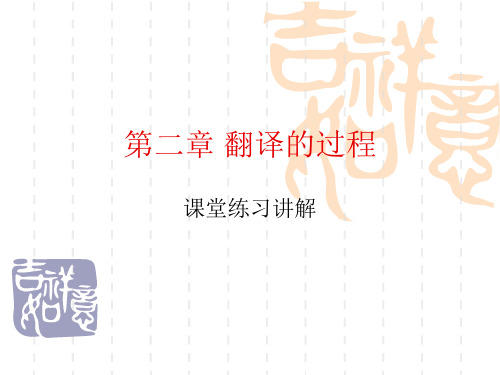
课堂互动4 :翻译句子(参考译文)
3.There are only three types of people: those who make things happen, those who watch things happen and those who say, “ What happened? ”
【译文】耐心是一切的关键。小鸡是从蛋里 孵出来的,不是把蛋壳敲破取出来的。
课堂互动2 :翻译句子(参考译文)
5.Histories make men wise; poets wittosophy deep; moral grave; logic and rhetoric able to contend.
【译文】这么鲁莽无礼,没完没了,真让我生气。
课堂互动2 :翻译句子(参考译文)
3.China is a very big country with a very big population.
【译文】中国幅员辽阔,人口众多。
课堂互动2 :翻译句子(参考译文)
4.The key to everything is patience. You get the chicken by hatching the egg not by smashing it.
【译文】话说,人生幸福只需三条:有 所爱,有所为,有所盼。
课堂互动1 :翻译句子(参考译文)
4.He smiled at that, with a rueful curve of his lips, but his eyes were alight with an emotion she was afraid to identify.
人教版语文课程句子翻译练习题及答案
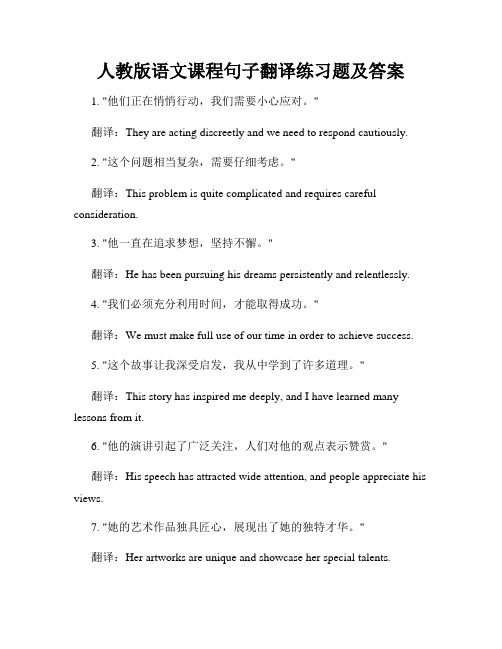
人教版语文课程句子翻译练习题及答案1. "他们正在悄悄行动,我们需要小心应对。
"翻译:They are acting discreetly and we need to respond cautiously.2. "这个问题相当复杂,需要仔细考虑。
"翻译:This problem is quite complicated and requires careful consideration.3. "他一直在追求梦想,坚持不懈。
"翻译:He has been pursuing his dreams persistently and relentlessly.4. "我们必须充分利用时间,才能取得成功。
"翻译:We must make full use of our time in order to achieve success.5. "这个故事让我深受启发,我从中学到了许多道理。
"翻译:This story has inspired me deeply, and I have learned many lessons from it.6. "他的演讲引起了广泛关注,人们对他的观点表示赞赏。
"翻译:His speech has attracted wide attention, and people appreciate his views.7. "她的艺术作品独具匠心,展现出了她的独特才华。
"翻译:Her artworks are unique and showcase her special talents.8. "这首诗歌充满了深情和美丽的意象,让人陶醉其中。
"翻译:This poem is filled with deep emotions and beautiful imagery, which is enchanting.9. "他们合作无间,共同完成了这个重要的项目。
汉译英翻译练习ppt课件

anybody else.
分析: 该句共有三层含义: A: 人们不敢出门; B: 尽管警察已 接到命令, 要作好准备以应付紧急情况; C: 警察也和其他人 一样不知所措和无能为力。在这三层含义中, B表示让步, C 表示原因, 而A则表示结果, 按照汉语习惯顺序, 我们作如下 的安排:
尽管警察已接到命令, 要作好准备以应付紧急情况, 但 人们不敢出门, 因为警察也和其他人一样不知所措和无能 为力。
Now you try:
For a family of four, for example, it is more convenient as well as cheaper to sit comfortably at home, with almost unlimited entertainment available, than to go out in search of amusement elsewhere.
分析: 这个句子由一个主句, 两个原因状语和一个定语从句, “铝直 到19世纪才被人发现”是主句, 也是全句的中心内容, 全句共有四个 谓语结构, 共有五层意思: A. 铝直到19世纪才被人发现; B. 由于在自 然界找不到游离状态的铝; C. 由于它总是跟其他元素结合在一起; D. 最普遍的是跟氧结合; E. 铝跟氧有很强的亲和力。按照汉语的表达 习惯通常因在前, 果在后, 这样, 我们可以逆着原文的顺序把该句翻 译成:
翻译课堂小练G-H

1.通过阅读旅游书籍,我们了解其他国家的情况。
(gain)
2.要想参观博物馆的人明天上午七点五十五分必须在校门口集中。
(gather)3.一般来说,老年人每天必须摄取足够的营养。
(take)
4.她瞥了一眼这张便条,认出是她叔叔的手迹。
(glance)
5.既然这么多人要来干活,恐怕工具不够分配。
(go around)
6.孩子们的吵闹声一直不断,我没法集中精力写文章。
(go on)
7.我们非常感谢老师为我们提供许多好书。
(grateful)
8.在此后的三个月里村里没有发生严重的问题。
(happen)
9.她的诚实和乐于助人深得同学们的爱戴。
(win the hearts of)
10.那位学者婉言谢绝了所有的邀请毫不犹豫地回到了祖国。
(hesitation)11.不管我们有多忙,我们一定要为他们举行一次欢送会。
(honor)
12.该士兵由于救了溺水的孩子而受到嘉奖。
(honor)
13.不管你多么聪明,不努力就不会成功。
(However)
14.他匆忙赶到售票处,结果发现所有的票子已销售一空。
(hurry v.)15.人们相信,爬高山可以消耗我们大量的体力。
(drain)。
课堂练习(笔译)
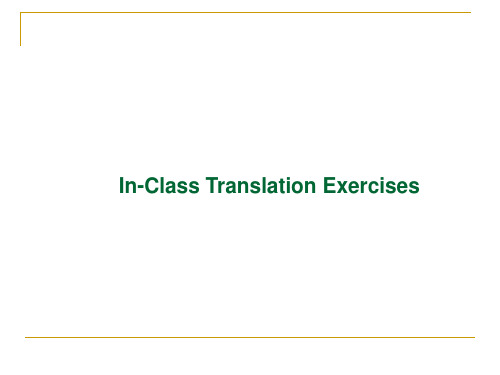
24. It is common experience that a certain amount of regular exercise improves the health and contributes to a feeling of well-being whether or not exercise adds to the length of life. 大家都能感受到,不管运动能否延年益寿,定期进行一 定量的运动能够强身健体,并使人精神愉悦。 25. Smaller class sizes in early grades translated into students scoring higher on math tests in later grades in Tennessee’s experiment to see if smaller classes improved education, a study said on Friday. 星期五一项研究宣称,田纳西州开展了一项实验,旨在 验证小班教学能否改进教学质量,结果表明低年级接受 小班教学的学生到了高年级数学考试成绩较好。
12. Petra became the leader of the girls as soon as she snapped out of her original depression at coming to Prague. 佩德拉刚到布拉格时心情郁闷,现在她开心起来,就立 即成为女孩子们的领袖。 13. The thought of returning filled him with fear. 他一想到要回去心里就害怕。 14. A gift is the key to open the door closed against you. 大门将你关在外,礼物送到自然开。 15. Nightfall found him many miles short of his destination. 夜幕降临时,他离目的地还有好几英里呢。
英文翻译 课堂练习

請將下列英文句子譯成中文
請將下列英文句子譯成中文
What do you do ?
Come ____ in!
e on in! What does your father do ?
He’s a baseball coach.
我母親是一位警官
Come on in!
2.What What do you do ?
克漏字填充
e on in! 2.What does your father do? 3.What do you do? 4.My mother is a police office. 5.He’s a baseball coach . 6.I’m a computer salesperson.
英文翻譯
堂課練習
請將下列英文句子譯成中文
e on in! 2.What does your father do ? 3.What do you do ? 4.My mother is a police officer. 5.He’s a baseball coach. 6.I’m a computer sal mother is a police officer.
5.He’s a baseball coach.
6.I’m a computer salesperson.
請將下列英文句子譯成中文
e on in! 2.What does your father do ? 3.What do you do ? 4.My mother is a police officer. 5.He’s a baseball coach. 我是一位電腦銷售員 6.I’m a computer salesperson.
請將下列英文句子譯成中文
翻译课课练(学生版)
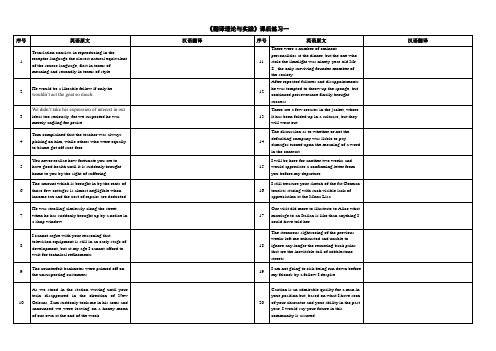
The strenuous sightseeing of the previous weeks left me exhausted and unable to ignore any longer the recurring back pains that are the inevitable toll of cobblestone streets.
《翻译理论与实践》课后练习一
序号
英语原文
汉语翻译
序号
英语原文
汉语翻译
1
Translation consists in reproducing in the receptor language the closest natural equivalent of the source language, first in terms of meaning and secondly in terms of style.
《翻译理论与实践》课后练习三
序号
英语原句
汉语翻译
序号
英语原句
4
The conductor told the boy off for throwing litter on the floor of the bus.
14
A friendship network is absolutely crucial for our as adults.
7
He was strolling aimlessly along the street, when he has suddenly brought up by a notice in a shop window.
17
Our visit did more to illustrate toAlicewhat marriage to an Italian is like than anything I could have told her.
汉英翻译课堂练习

汉英翻译课堂练习所谓革命高潮快要到来的“快要”二字作何解释,这点是许多同志共同的问题。
马克思主义不是算命先生,未来的发展和变化,只应该也只能说出个大方向,不应该也不可能机械的规定时日。
中国革命高潮快要到来。
它是站在海岸遥望海中已经看得见桅杆尖头了的一只航船,它是立于高山之巅远看东方已见光芒四射喷薄欲出的一轮朝阳,它是躁动于母腹中的快要成熟了的一个婴儿。
---《星星之火,可以燎原》How should we explain /interpret the word “soon” in the statement, “there will soon be a high tide of revolution”? This is a common question among comrades. Marxists are not fortune-tellers. They should and indeed car, only indicate the general direction of future development and changes; they should not and cannot fix the day and hour in a mechanistic way. There will soon be a high tide of revolution in China. It is like a ship far out at sea whose mast-head can already be seen from the shore; it is like the morning sun in the east whose shimmering rays are visible from a high mountain top; it is like a baby about to be born moving restlessly in its mother’s womb.我们的国家大,人口众多,经济落后,农业要搞上去,最重要的还是要依靠一系列正确的政策调动农民的积极性,自力更生,艰苦奋斗。
《实用翻译教程》英译汉课堂练习(01)
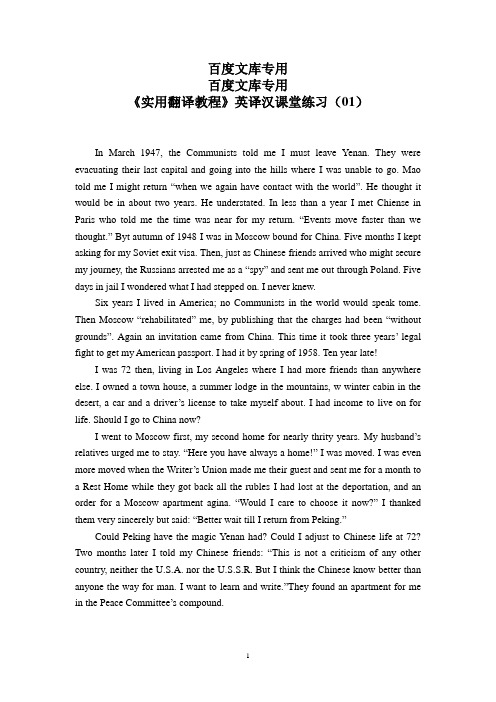
百度文库专用百度文库专用《实用翻译教程》英译汉课堂练习(01)In March 1947, the Communists told me I must leave Yenan. They were evacuating their last capital and going into the hills where I was unable to go. Mao told me I might return “when we again have contact with the world”. He thought it would be in about two years. He understated. In less than a year I met Chiense in Paris who told me the time was near for my return. “Events move faster than we thought.” Byt autumn of 1948 I was in Moscow bound for China. Five months I kept asking for my Soviet exit visa. Then, just as Chinese friends arrived who might secure my journey, the Russians arrested me as a “spy” and sent me out through Poland. Five days in jail I wondered what I had stepped on. I never knew.Six years I lived in America; no Communists in the world would speak tome. Then Moscow “rehabilitated” me, by publishing that the charges had been “without grounds”. Again an invitation came from China. This time it took three years’ legal fight to get my American passport. I had it by spring of 1958. Ten year late!I was 72 then, living in Los Angeles where I had more friends than anywhere else. I owned a town house, a summer lodge in the mountains, w winter cabin in the desert, a car and a driver’s license to take myself about. I had income to live on for life. Should I go to China now?I went to Moscow first, my second home for nearly thrity years. My husband’s relatives urged me to stay. “Here you have always a home!” I was moved. I was even more moved when the Writer’s Union made me their guest and sent me for a month to a Rest Home while they got back all the rubles I had lost at the deportation, and an order for a Moscow apartment agina. “Would I care to choose it now?”I thanked them very sincerely but said: “Better wait till I return from Peking.”Could Peking have the magic Yenan had? Could I adjust to Chinese life at 72? Two months later I told my Chinese friends: “This is not a criticism of any other country, neither the U.S.A. nor the U.S.S.R. But I think the Chinese know better than anyone the way for man. I want to learn and write.”They found an apartment for me in the Peace Committee’s compound.《实用翻译教程》英译汉课堂练习(02)When I reached the age of twelve I left the school for ever and got my first fulltime job, as a grocer’s boy. I spent my days carrying heavy loads, but I enjoyed it. It was only my capacity for hard work that saved me from early dismissal, for I could never stomach speaking to my “betters”with the deference my employer thought I should assume.But the limit was reached on Tuesday my half holiday. On my way home on that day I used to carry a large basket of provisions to the home of my employer’s sister-in-law. As her house was on my way home I never objected to this.On this particular Tuesday, however, just as we were putting the shutters up, a load of smoked hams was delivered at the shop. “Wait a minute,” said the boss, and he opened the load and took out a ham, which he started to bone and string up.I waited in growing impatience to get on my way, not for one minute but for quite a considerable time. It was nearly half-past two when the boss finished. He then came to me with the ham, put it in the basket beside me, and instructed me to deliver it to a customer who had it on order.This meant going a long way out of my road home, so I looked up and said to the boss: “Do you know I finish at two on Tuesday?” I have never seen a man look more astonished than he did then. “What do you mean?” he gasped. I told him I meant that I would deliver the groceries as usual, but not the ham.He looked at me as if I were some unusual kind of insect and burst into a storm of abuse. But I stood firm. He gave me up as hopeless and tried new tactics. “Go out and got another boy,” he yelled at a shop-assistant.“Are you going to deliver them or not?” the boss turned to me and asked in a threatening tone. I repeated what I had said before. “Then, out of here,” he shouted, So I got out.This was the first time I had serious trouble with an employer.《实用翻译教程》英译汉课堂练习(03)Four score and seven years ago our fathers brought forth on this continent, a new nation, conceived in Liberty, and dedicated to the proposition that all men are created equal.Now we are engaged in a great civil war, testing whether that nation or any nation so conceived and so dedicated, can long endure. We are met on a great battle-field of that war. We have come to dedicate a portion of the field, as a final resting place for those who here gave their lives that that nation might live. It is altogether fitting and proper that we should do this.But, in a larger sense, we can not dedicate—we can not consecrate—we can not hallow—this ground. The brave men, living and dead, who struggled here, have consecrated it, far above our poor power to add or detract. The world will little note, nor long remember what we say here, but it can never forget what they did here. It is for us the living, rather, to be dedicated here to the unfinished work which they who fought here have thus far so nobly advanced. It is rather for us to be here dedicated to the great task remaining before us—that from these honored dead we take increased devotion to that cause for which they gave the last full measure of devotion—that we here highly resolve that these dead shall not have died in vain—that this nation, under God, shall have a new birth of freedom—and that government of the people, by the people, for the people, shall not perish from the earth.《实用翻译教程》英译汉课堂练习(04)They tell us, sir, that we are weak—unable to cope with so formidable an adversary. But when shall we be stronger? Will it be the next week or the next year? Will it be when we are totally disarmed, and when a British guard shall be stationed in every house? Shall we gather strength by irresolution and inaction? Shall we acquire the means of effectual resistance by lying supinely on our back, and hugging the delusive phantom of hope, until our enemies shall have bound us hand and foot? Sir, we are not weak, if we make a proper use of those means which the God of nature hath placed in our power. Three millions of people, armed in the holy cause of liberty and in such a country as that which we possess, are invincible by any force which our enemy can send against us. Besides, sir, we shall not fight our battles alone. There is a just God who presides over the destinies of notions; and who will raise up friends to fight our battles for us. The battle, sir, is not to the strong alone; it is to the vigilant, the active, the brave. Besides, sir, we have no election. If we were base enough to desire it, it is now too late to retire from the contest. There is no retreat, but in submission and slavery! Our chains are forged. Their clanking may be heard on the plains of Boston! The war is inevitable—and let it come! I repeat it, sir, let it comeIt is in vain, sir, to extenuate the matter. Gentlemen may cry, peace, peace—but there is no peace. The war is actually begun! The next gale that sweeps from the north will bring to bur ears the clash of resounding arms! Our brethren are already on the field! Why stand we here idle? What is it that gentlemen wish? What would they have? Is life so dear, or peace so sweet, has to be purchased at the price of chains and slavery? Forbid it, Almighty God! I know not what course others may take; but as for me, give me liberty, or give me death!《实用翻译教程》英译汉课堂练习(05)Proverbs are the popular sayings that brighten so much Latin American talk, the boiled-down wisdom that you are as apt to hear from professors as from peasants, from beggars as from elegances. Brief and colorful, they more often than not carry a sting.When a neighbor’s dismally unattractive daughter announced her engagement, Imelda remarked, “You know what they say, Senora: ‘There’s no pot so ugly it can’t find a lid.’” And when her son-in-law blustered about how he was going to get even with the boss who had docked his pay, Imelda fixed him with a cold eye and said, “Little fish does not eat big fish.”One afternoon, I heard Imelda and her daughter arguing in the kitchen. Her daughter had quarreled with her husband’s parents, and Imelda was insisting that she apologized to them. Her daughter objected. “But, Mama, I just can’t swallow them, not even with honey. They talk so big until we need something; then they’re too poor. So today when they wouldn’t even lend us enough to pay for a new bed, all I did was say something that I’ve heard you say a hundred times: ‘If so grand, why so poor? If so poor, why so grand?”“Impertinent!” snorted Imelda. “Have I not also taught you, ‘What the tongue say, the neck pays for’? I will not have it said that I could never teach my daughter proper respect for her elders. And before you go to beg their pardon, change those trousers for a dress. You know how your mother-in-law feels about pants on a woman. She always says, ‘What was hatched a hen must not try to be a rooster!”Her daughter made one more try. “But Mama, you often say, ‘If the saint is annoyed, don’t pray to him until he gets over it.’ Can’t I leave it for tomorrow?”“No, no and no! Remember: ‘If the dose is nasty, swallow it fast.’ You know, my child, you did wrong. But, ‘A gift is the key to open the door closed against you.’ I have a cake in the oven that I was making for the Senora’s dinner, I will explain to the Senora. Now, dear, hurry home and make yourself pretty in your pink dress. By the time you get back, I will have the cake ready for you to take to your mother-in-law. She will be so pleased that she may make your father-in-law pay for the bed. Remember: ‘One hand washes the other, but together they wash the face.’”《实用翻译教程》英译汉课堂练习(06)I took home a briefcase full of troubles. As I sat down on that hot and humid evening, there seemed to be no solutions to the problems thrashing around in my brain. So I picked up a book, settled into a comfortable chair and applied my own special therapy—supper-slow reading.I spent three or four hours on two short chapters of Personal History by Vincent Sheean—savoring each paragraph, lingering over a sentence, a phrase, or even a single word, building a detailed mental picture of the scene. No longer was I in Sydney, Australia, on a sticky heart-wave night. Relishing every word, I joined foreign correspondent Sheean on a mission to China and another to Russia. I lost myself in the author’s world. And when finally I put in down, my mind was totally refreshed.Next morning, four words from the book—“take the long view”—were still in my mind. At my desk, I had a long-view look at my problems. Once more, super-slow reading had given me not only pleasure but perspective, and helped me in my everyday affairs.I discovered its worth years ago….Previously, if I had been really interested in a book, I would race from page to page, eager to know what came next. Now, I decided, I had to become a miser with words and stretch every sentence like a poor man spending his last dollar.I has stared with the practical object of making my book last. But by the end of the second week I began to realize how much I was getting from super-slow-reading itself. Sometimes just a particular phrase caught my attention, sometimes a sentence. I would read it slowly, analyze it, read it again—perhaps changing down into an even lower gear—and then sit for 20 minutes thinking about it before moving on. I was like a pianist studying a piece of music, phrase by phrase, rehearsing it, trying to discover and recreate exactly what the composer was trying to convey.《实用翻译教程》英译汉课堂练习(07)From this motive I began to think seriously of matrimony, and choose my wife, as she did her wedding gown, not for a fine glossy surface, but such qualities as would wear well. To do her justice, she was a good-natured, notable woman; and as for breeding there were few country ladies who could show more. She could read any English book without much spelling; but for pickling, preserving, and cookery, none could excel her. She prided herself also upon being an excellent contriver in housekeeping, though I never could find that we grew richer with all her contrivances.However, we loved each other tenderly, and our fondness increased as we grew old. There was, in fact, nothing that could make us angry with the world or each other. We had an elegant house, situated in a fine country, and a good neighbourhood. The year was spent in moral and rural amusements, in visiting our rich neighbours, and relieving such as were poor. We had no revolutions to fear, more fatigues to undergo; all our adventures were by the fireside, and all our migrations from the blue bed to the brown.As we lived near the road, we often had the traveler or stranger visit us to taste our gooseberry wine, for which we had great reputation; and I profess, with the veracity of an historian, that I never knew one of them to find fault with it. Our cousins, too, even to the fortieth remove, all remembered their affinity and come very frequently to see us. Some of them did us no great honour by these claims of kindred; as we had the blind, the maimed, and the halt amongst the number. However, my wife always insisted that as they were that same flesh and blood, they should sit with us at the same table. So that if we had not very rich, we generally had very happy friends about us; for this remark will hold good through life, that the poorer the guest, the better pleased he ever is with being treated; and as some men gaze with admiration at the colours of a tulip, or the wing of butterfly, so I was by nature an admirer of happy human faces. However, when any one of our relations was found to be a person of very bad character, a troublesome guest, or one we desired to get rid of, upon his leaving my house I ever took care to lend him a riding-coat or a pair of boots, or sometimes a horse of small value, and I always had the satisfaction of finding he never came back to return them. By this the house was cleared of such as we did not like; but never was the family of Wakefield known to turn the traveler or the poor dependant out of doors.《实用翻译教程》英译汉课堂练习(08)LectureThe traditional pattern of classroom experience at the college level brings the professor and a group of 20 to 30 students together for a 45-to-50-minute class session tow or three times a week. The most common mode of instruction is the lecture. When lectures are the principal method of instruction in larger classes, regular periods may be set aside for small group discussions under the leadership of an assistant instructor. In cases where a small class size encourages informality, lectures may be combined with discussions sessions based on assigned readings, required textbooks, and other outside materials.Accurate, legible notes are invaluable aids to the student who is enrolled in a lecture course. Notes should be taken during lectures, and when the student is reading the texts prior to each session of the course. The key to good note-taking is to be able to listen a lot and to write only as much as is needed to record the essence of a point or idea presented by the lecturer. Thus, students should endeavor to identify only the main points and ideas being presented and to write them down in outline form. They should also strive to take good notes the first time and not plan to recopy notes—or to do so only when clarity and conciseness demand it. Finally, they should review their notes for about five minutes on the same day that they take them, and go over them again for about half an hour at least once a week, according to a regular schedule or plan. There is no course syllabus to be memorized; instead, the examinations will be base on the material presented in the lectures and textbooks.ReadingReading skills are equally important. Experts estimate that it is possible for any normal adult English speaker to read 1,000 words a minute (and more), with special training. Yet most students read only about 300 words per minute. The following principles might be helpful for foreign students who whish to increase their reading skill:1. Always s read faster than is comfortable. The faster your normal rate of reading become, the better your understanding will be.2. While reading do not allow yourself to regress, but keep reading ahead in very sentence, even when you come across a new word. If some word, term, or phrase has clouded your understanding, you should reread it only after you have read the entire paragraph through once.3. Read selectively. As you read make a conscious effort to screen the nouns, pronouns, and verbs from the other words, since these are the words that give meaning to what you have read. In effect, you should really read nouns, pronouns, and verbs and merely see the rest of the words in the sentence.《实用翻译教程》英译汉课堂练习(09)Joe’s dark eyes searched frantically for Cleo as he marched with the other Negro soldiers up the long thoroughfare towards the boat. Women were running out to the line of march, crying and laughing and kissing the men good-by. But where the hell was Cleo?Beside him Luke Robinson, big and fat, nibbled from a carton of Baby Ruth candy a he walked. But Joe’s eyes kept traveling up and down the line of civilians on either side of the street. She would be along here somewhere; any second now she would come calmly out of the throng and walk alongside him till they reached the boat. Joe’s mind made a picture of her, and she looked the same as last night when he left her. As he had walked away, with the brisk California night air biting into his warm body, he had turned for one last glimpse of her in the doorway, tiny and smiling and waving good-by.They had spent last night sitting in the little two-by-four room where they had lived for three months with hardly enough space to move around. He had rented it and sent for her when he came to California and learned that his outfit was training for immediate shipment to Korea, and they had lived there fiercely and desperately, like they were trying to live a whole lifetime. But last night they had sate on the side of the big iron bed, making conversation, half-listening to a portable radio, acting like it was just any night. Playing-acting like in the movies.It was late in the evening when he asked her, “How’s little Hoey acting lately?”She looked down at herself. “Oh, pal Joey is having himself a ball.” She smiled, took Joe’s hand, and placed it on her belly; and he felt movement and life. His and her life, and he was going away from it and from her, maybe forever.Cleo said, “He’s trying to tell you good-by, darling.” And she satvery still and seemed to ponder over her own words. And then all of a sudden she burst into tears.She was in his arms and her shoulders shook. “It isn’t fair! Why can’t they qtake the ones that aren’t married?”He hugged her tight, feeling a great fullness in his throat. “Come on now, stop crying, hon. Cut it out, will you? I’ll be back home before little Joey sees daylight.”“You may never come back. They’re killing a lot of our boys over there. Oh, Joe, Joe, why did they have to go and start another war?”《实用翻译教程》英译汉课堂练习(10)Old Henry and his wife Phoebe were as fond of each other as it is possible for two old people to be who have nothing else in this life to be fond of. He was a thin old man, seventy when she died, a queer, crotchety person with coarse gray-black hair and beard, quite straggly and unkempt. He looked at you out of dull, fishy, watery eyes that had deep-brown crow’s-feet at the sides. His clothes, like the clothes of many farmers, were aged and angular and baggy, standing out at the pockets, not fitting about the neck, protuberant and worn at elbow and knee. Phoebe Ann was thin and shapeless, a very umbrella of a woman, clad in shabby black, and with a black bonnet for her best wear. As time had passed, and they had only themselves to look after, their movements had become slower and slower, their activities fewer and fewer. The annual keep of pigs had been reduced from five to one grunting porker, and the single horse which Henry now retained was a sleepy animal, not over-nourished and not very clean. The chickens, of which formerly there was a large flock, had almost disappeared, owing to ferrets, foxes, and the lack of proper care, which produces disease. The former healthy garden was now a straggling memory of itself, and the vines and flower-beds that formerly ornamented the windows and dooryard had now become choking thickets. A will had been made which divided the small tax-eaten property equally among the remaining four, so that it was really of no interest to any of them. Yet these two lived together in peace and sympathy, only that now and then old Henry would become unduly cranky, complaining almost invariably that something had been neglected or mislaid which was of no importance at all.“Phoebe, where’s my corn-knife? You ain’t never minded to let my thins alone no more.”“Now you hush, Henry,” his wife would caution him in a cracked and squeaky voice. “If you don’t, I’ll leave yuh. I’ll git up and walk out of here some day, and then where would y’l be? Y’ ain’t got anybody but me to look after yuh, so yuh just behave yourself. Your corn-knife’s on the mantel where it’s allus been unless you’ve gone an’put it summers else.”Old Henry, who knew his wife would never leave him in any circumstances, used to speculate at times as to what he would do if she were to die. That was the one leaving that he really feared. As he climbed on the chair at night to wind the old, long-pendulumed, double-weighted clock, or when finally to the front and the back door to see that they were safely shut in, it was a comfort to know that Phoebe was there, properly ensconced on her side of the bed, and that if he stirred restlessly in the night, she would be there to ask what he wanted.“Now, Henry, do lie still! You’re as restless as a chicken.”“Well, I can’t sleep, Phoebe.”“Well, yuh needn’t roll so, anyhow. Yuh kin let me sleep.”This usually reduced him to a state of somnolent ease. If she wanted a pail of water, it was a grumbling pleasure for him to get it; and if she did rise first to build thefires, he saw that the wood was cut and placed within easy reach. They divided this simple world nicely between them.《实用翻译教程》英译汉课堂练习(11)It was a fine day in early Spring. Bright sunshine flooded the street where a group of boys in Sunday clothes were playing ball. In most of the tenements the windows were up. Clean-shaven men in collarless shirts or in underwear, women with aprons or sloppy pink wrappers leaned on the sills and gazed with aimless interest at the street, the sky, those who were passing below. Thus they would spend most of every Sunday morning through the coming summer and now, in the first flush of mild weather, they had already taken up their posts. The street rang with the animated bickering of the boys at their game, with the click of a girl’s shoes as she shipped rope, with the muted sounds of a dozen unseen radios.Into this familiar scene came a sudden intruder: an odd-looking ambulance with glazed window. It turned into the street quietly, moved along slowly as the driver searched for a number, and then came to a stop before a rooming house a drab, four-story building of yellowish, soot-stained brick. In the tenement windows above all eyes turned to the ambulance. On the street all games stopped and, in an instant, the ambulance was surrounded by children.Those who knew why it had come told the others. An hour earlier there had been a police car and, still earlier, two men from the gas company. The odor of gas emanating from the building has been so strong that it had made church-goers sniff as they passed by on the street.Up above now, in the open windows of the surrounding tenements, new faces had appeared, and eyes were riveted on the doorway of the yellow brick building. No on talked, no one moved away, and no one came down.When the tow men in the front seat of the ambulance stepped out and walked into the house, one of the boys, a wiry, sallowfaced, blond lad, jerked his thumb and murmured softly to the others: “Oh, mama, ain’t they got the job?”“They’ll be carrying you down some day, Shortly,”a stoutish lad commented with an attempt at humor.The door of the rooming house opened again and conversation stopped. Both men came out. They walked to the rear of the ambulance and opened the door. Inside all was dazzling white, excessively sanitary-looking. Piled one on the other were several unpainted pine boxes without covers. The men lifted out the topmost one. The children became very still, even the youngest one ceasing their chatter. The man who was holding the rear of the box rested it for a moment on his hip and thigh, while using his free hand to close the door. They went inside with the smaller youngsters tailing after them. The landlady shut the door and leaned against the jamb with folded arms. “Beat it,” she said.The men appeared. The box had its anonymous occupant now in its dark, canvasshroud. The younger children stared in eager fascination, but it was clear that they could not fully comprehend. The older boys, clumped together, looked on intensely, lips pressed together. The blond boy quickly crossed himself.《实用翻译教程》英译汉课堂练习(12)Thousands of years ago the ancient peoples found out that days were longer in summer than in winter, and nights were shorter. They knew that this had a great deal to do with the changes of the seasons and the growth of plants and animals. They determined through generations of painstaking observation that the day was shortest in the Northern Hemisphere on the 22nd of December, after which it gradually grew longer until the 21st of June, when the day was the longest in the year and the night was the shortest. After that, the day would begin to shorten again gradually. In the beginning, the actual dates of these two days had to be calculated for each individual year, and depended on what kind of calendar was being used.The first calendar to fix these days on definite dates of the year was the solar calendar, which had 365 days in a year an d—every four year s—a “leap-year” with one extra day.To an observer on earth, the sun seems to move farther and farther away from the equator to the north until on June 21st it seems to reach its furthest point north. Then it seems to “pause”for one day before it turns around and goes back. Then it goes further and further south until on December 22nd it appears to “pause” again for one day before swerving back north again. These two days are called the Summer Solstice and the Winter Solstice respectively.Now we know that all this is caused by the movement of the earth around the sun. as the earth journeys around the sun, it spins on its own axis. This can be illustrated by a simple experiment. If you push a sharp stick through a rubber ball and twirl it with two fingers, the ball spins around I much the same way the earth is spinning at this very moment. The points where the stick comes through the ball correspond to the North and South Poles. If you twirl this ball at night directly in front of a bright light, you will notice that half the ball is lighted up while the other half is in the shade. That is just like our night and day. If you keep the stick strictly vertical to the light and twirl it at an even speed, any spot on the ball’s surface will be in the light and in the shade the same length of time.If the earth were spinning just like this rubber ball, there would only be day and night on earth, but no seasons, and days would always be the same length as night s—12 hours each. But that is not how the earth spins. It spins with its axis tilted. Its axis is always at the angle to the plane of its orbi t—and angle of about 23.5 degrees.It is this tilting that accounts for our four seasons and the lengthening and shortening of days and nights. For this reason also, the Equator (an imaginary line drawn around the earth at equal distance from the two poles) is not always directly under the sun’s rays. For six months the earth is tilted towards the sun, and the Northern Hemisphere gets more than its share of sunlight every day. Days are longer。
